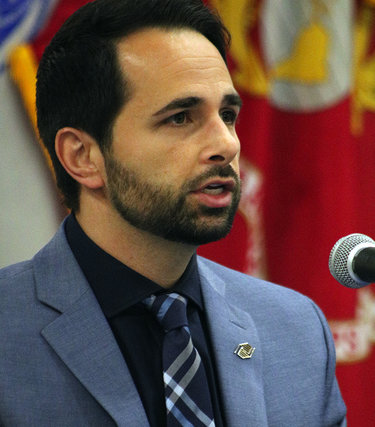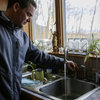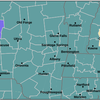Nourish New York will purchase food from upstate farms for food banks to feed the hungry
ALBANY COUNTY — On Monday, as food banks across the state are dealing with increased demand, Governor Andrew Cuomo said the state would provide $25 million from its public health emergency fund for food banks and providers most impacted by COVID-19.
Since March 16, the Regional Food Bank of Northeastern New York has increased the food it donates by 50 percent, distributing more than five million pounds, said its executive director, Mark Quandt, on Sunday.
Cuomo said Westchester County had seen a 200-percent increase in need, New York City had a 100-percent increase; Long Island, 40 percent; and upstate New York, 40 to 60 percent.
“I’m also asking philanthropies to help,” said Cuomo.
Philanthropies that would like to help the state’s food banks are to contact Fran Barrett, director of nonprofits, at COVIDPhilanthropies@exec.ny.gov.
Cuomo also announced the launch of the Nourish New York Initiative to purchase food and products from upstate farms and direct it to food banks across the state.
“Because the markets are so roiled, some farm cooperatives are actually dumping milk because the market can’t consume it,” said Cuomo. “This is just total waste to me. We have people downstate who need food. We have farmers upstate who can’t sell their product. We have to put those two things together. It’s just common sense.”
The Nourish New York Initiative will be led by Kelly Cummings, director of State Operations and Infrastructure; Richard Ball, commissioner of Agriculture; Rossana Rosado, Secretary of State; Karim Camara, executive director of the Office of Faith-Based Community Development Services; Fran Barrett, director of nonprofits; and Mike Hein, Commissioner of the Office of Temporary and Disability Assistance.
The state will also be partnering with the state’s dairy producers, like Chobani, Dairy Farmers of America, Upstate Niagara, and Cabot Cheese, to process excess milk into products like yogurt, cheese, sour cream, and cream cheese, which will be distributed to food banks and those in need.
Last week, two Hilltown farmers, who both sell their milk to the Dairy Farmers of America cooperative, told The Enterprise they were not dumping their milk but they were still hurting. The cooperative has said there will be delays in checks for milk; a deduction will be added to cover COVID-19 costs; and the cooperative, starting in May, will pay full value for only 85 percent of their milk.
“We’re also immediately to stop this dumping of milk, going to work with industries in our state who can use the milk and get it to people who need it,” said Cuomo. “So I want to thank these companies who will be working with us to buy the excess milk, yogurt, cheese, sour cream, cream cheese, and then we’ll give it to the food banks that are downstate.”
Boys and Girls Clubs deliver hot meals
One of the local organizations that uses food-bank goods is the Boys and Girls Clubs of the Capital Area, which, since the coronavirus outbreak, has been delivering hot meals — breakfasts and lunches — to families in need.
The organization’s chief executive officer, Justin Reuter, said at Monday’s Albany County press briefing that, so far, 60,000 meals have been served at 12 locations in Albany and Troy.
“When schools are open, our organization serves 1,100 hot meals every single day,” said Reuter, in after-school programs. “We had to act fast to ensure boys and girls did not go hungry.”
He noted that, with the shutdown, many people are unemployed and worried about how to feed their families. As soon as the governor’s executive order closed the schools statewide, Reuter said, “Boys and Girls Clubs of the Capital Area knew that food access would be a very big challenge.”
On the first day, the program served 425 meals; it’s now serving 2,100 each day on Mondays through Thursdays, and 4,200 on Fridays to provide an extra meal for the following day.
The mobile meal service allows the organization to “bring food right to the front doors of families,” said Reuter.
School districts and other community partners are pitching in, he said. “In the beginning, our goal was to feed youth but, as we have seen, many adults are also asking for food as well.
The group relies on donations, corporate partners, and volunteers, Reuter said.
“People are really scared to leave their homes right now,” he said. “Additionally, a lot of these families reside in so-called food deserts.”
He asked those at the press briefing to imagine a mother with young children having to take a bus to a grocery store to shop, all the while expecting her children to maintain social distancing guidelines. “It’s truly a scary thought for many,” he said.
Reuter said there have “definitely been some challenging days” as volunteers battled rain and cold weather to deliver meals.
“But without those deliveries, children might go hungry,” he said. “Our staff and volunteers have done whatever it takes to make sure children are eating.”
Reuter said supplies have also been delivered along with meals. Books and census information have been delivered and so have STEM (science, technology, engineering, and math) kits from Rensselaer Polytechnic Institute.
Anyone who would like to volunteer or donate may call 518-462-5528, ext. 1005 or go online to www.bgccapitalarea.org.
“Every three-dollar donation equates to one meal being served in the community,” said Reuter.
He also said, “The need for food continues to grow as this pandemic continues on.”



